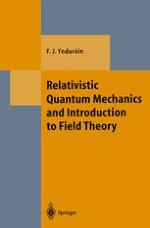1996 | OriginalPaper | Buchkapitel
Spin 1/2 Particles
verfasst von : Professor Francisco J. Ynduráin
Erschienen in: Relativistic Quantum Mechanics and Introduction to Field Theory
Verlag: Springer Berlin Heidelberg
Enthalten in: Professional Book Archive
Aktivieren Sie unsere intelligente Suche, um passende Fachinhalte oder Patente zu finden.
Wählen Sie Textabschnitte aus um mit Künstlicher Intelligenz passenden Patente zu finden. powered by
Markieren Sie Textabschnitte, um KI-gestützt weitere passende Inhalte zu finden. powered by
Given a positive-definite operator, such as (m2c4 + P2c2), there is a mathematical theorem that guarantees that there is one, and only one, square root that is also positive definite, denoted by +(m2c4 + P2c2)1/2. Other square roots become possible if we give up positive definiteness. This may appear to spoil the theory by allowing negative energies; but, if the operator is Hermitean, states corresponding to negative energies will be orthogonal to positive-energy states and a sensible physical theory is obtained if we restrict ourselves to the latter. We can, moreover, ensure manifest covariance by looking for an equation not only linear in ∂t but also linear in the space derivatives; that equation, we expect, will describe relativistic spin 1/2 particles, such as the electron1. We then use a multicomponent wave function2, $$\mathop \Psi \limits_ \sim $$, and look for an equation linear in the P μ , the Dirac equation, 3.1.1$$ih{\partial _t}\underset{\raise0.3em\hbox{$\smash{\scriptscriptstyle\thicksim}$}}{\Psi } \left( {r,t} \right) = {\underset{\raise0.3em\hbox{$\smash{\scriptscriptstyle\thicksim}$}}{H} _0}\underset{\raise0.3em\hbox{$\smash{\scriptscriptstyle\thicksim}$}}{\Psi } = - ihc\underset{\raise0.3em\hbox{$\smash{\scriptscriptstyle\thicksim}$}}{a} \nabla \underset{\raise0.3em\hbox{$\smash{\scriptscriptstyle\thicksim}$}}{\Psi } \left( {r,t} \right) + m{c^2}\underset{\raise0.3em\hbox{$\smash{\scriptscriptstyle\thicksim}$}}{\beta } \underset{\raise0.3em\hbox{$\smash{\scriptscriptstyle\thicksim}$}}{\Psi } \left( {r,t} \right),$$ where the free Dirac Hamiltonian$$\underset{\raise0.3em\hbox{$\smash{\scriptscriptstyle\thicksim}$}}{H} _0 $$ satisfies 3.1.2$$\underset{\raise0.3em\hbox{$\smash{\scriptscriptstyle\thicksim}$}}{H} _0^2 = {m^2}{c^4} + {c^2}{P^2};$$3.1.3$${{\underset{\raise0.3em\hbox{$\smash{\scriptscriptstyle\thicksim}$}}{H} }_0} = ihc\underset{\raise0.3em\hbox{$\smash{\scriptscriptstyle\thicksim}$}}{a} \nabla + m{c^2}\underset{\raise0.3em\hbox{$\smash{\scriptscriptstyle\thicksim}$}}{\beta }$$
